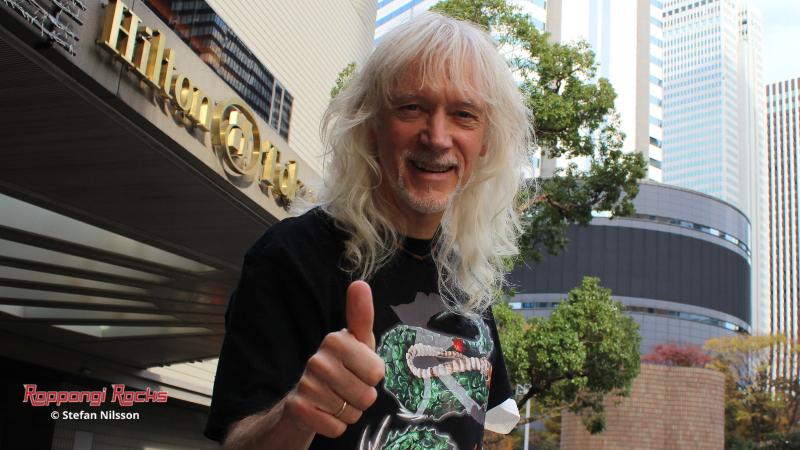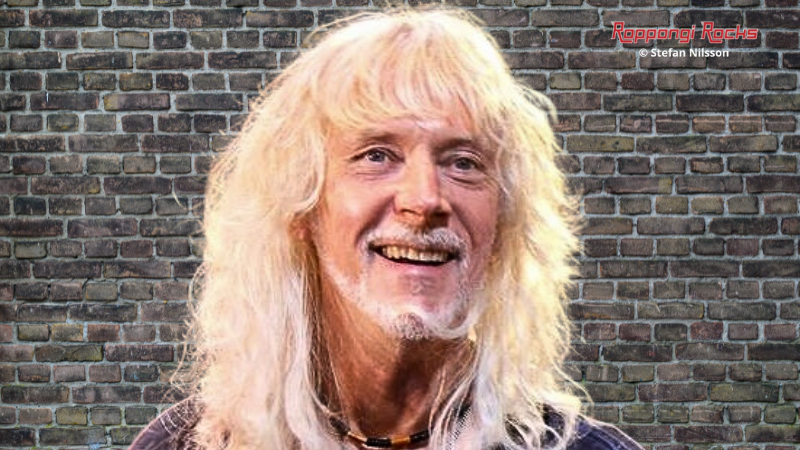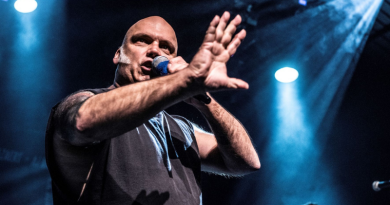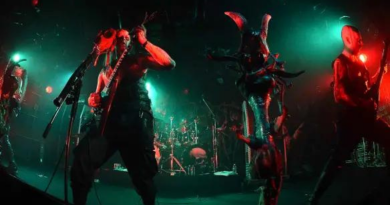Steve Mann of MSG – Part 2: “People are coming to shows again”
Here’s part two of Roppongi Rocks’ interview with Steve Mann of MSG and Lionheart which took place when he recently visited Japan.
Best-known as guitarist and keyboardist for the Michael Schenker Group, British musician Steve Mann is also a member of Lionheart and a past member of The Sweet and Tytan. He is since many years based in Germany where he runs his own studio.
You are a good 20 metres away from Michael on stage. How do you keep the chemistry? Through telepathy? “From a technical point of view, there are the monitors. So, on my side of the stage, I can hear what Michael’s doing and I can hear what the drums are doing. I suppose that we’ve worked together for so long it’s a bit of telepathy involved without us realising it. We are used to working with each other. He’s going forward and I might go back or he’s out on the wing and I go out on the wing as well. Out of the corner of my eye and out of the corner of his eye, we’re watching each other. We’re kind of watching the rest of the band. It’s not just me and Michael, it’s how the whole band align on stage. That’s very important and we spend a lot of time working on that. As a band, we work very much on this idea of positioning on the stage and also depth. So, if a couple of people move forward, the others may drop back a little bit. We are always watching each other.”
Early in your career, in the late 70s, you opened for UFO with your band Liar. Now you are on stage with former UFO guitarist Michael Schenker playing UFO songs. You’ve kind of come full circle. But Michael had left UFO by the time you toured with them, right? “Actually, it was the first tour without Michael, after he left. I am a great believer in destiny. I’m not quite sure how it all works. I love the whole theory behind it. I do a lot of reading on that particular subject. I always feel that things always happen for a reason. Sometimes, whatever happens in the present, now, may have been hit on in the past. Because, somehow, one is connected to the other. So, yes, I think there probably is this kind of circle. It probably wasn’t a coincidence that I had that first association with UFO. I used to watch them once we had played our set. Every night I went into the audience and watched UFO. I first saw Michael around ‘74 in London. The whole thing comes full circle being back on stage playing UFO songs. It almost feels like ‘Yeah, this was all planned, somewhere’. But I don’t know who planned it.”
You came into MSG when the band had already existed for six-seven years and the same thing with The Sweet who already had a legacy. But it seems that when you have joined legacy acts, you’ve created new music. Is it important to you not to just play the back catalogue? “That’s very much what I personally want to do, yes. It can be difficult. Certainly, with bands like The Sweet. Because most of the audience that come to see The Sweet, were there in the 70s. They know ‘Ballroom Blitz’, ‘Hellraiser’, ‘Fox on the Run’, ‘Action’… You name it. They’re the songs they want to hear, so to try to do new music with a band like The Sweet is very difficult. We had the ‘A’ album and played some tracks from that one when we played live. They politely clapped. But when it came to the hits from the 70s, of course, that’s what they were there to hear. I think MSG is a little bit different. Michael is still very current. When he does new albums, people go out and buy the albums and listen and they learn the new songs. For example, when we come here to Japan, they very much like the new albums and they know the songs. In America, for example, when we introduced songs from recent albums, they might look a little bit like ‘Oh, not sure about that one’. Here in Japan, they know the songs. When Ronnie Romero introduced ‘Sail the Darkness’ yesterday, a big cheer went up. They obviously knew the song. It’s a lot easier with a band like MSG to come and push forward. But, on the other hand, they still want to hear the old MSG and UFO songs, which we totally understand.”
In your band Lionheart, you’ve had members from Iron Maiden, Judas Priest, MSG, Tygers of Pan Tang, Uriah Heep, The Sweet and so on. What is it about Lionheart? The legacy is bigger than the band. “It is. That’s right. We are all doing different things. We come together whenever we can. It’s a great band. What impresses me is that the Lionheart fan base never goes away. I’m always getting messages from people or when we meet people in reception areas, when they come to see the band, they give me Lionheart albums to sign and ask me when the new album is coming out. The Lionheart fan base is always there.”
The Lionheart family tree spreads across the whole rock world. “For example, like Les Binks and Judas Priest, obviously, Dennis Stratton was with Iron Maiden before Lionheart, but there’s the MSG thing that came out of it. There’s been a lot of attached careers. Tygers of Pan Tang is another one. And another Iron Maiden connection with Nicko, Nicko McBrain was in Lionheart just before he joined Iron Maiden. There are a lot of connections that go through Lionheart. It starts with Lionheart and then goes out to all these other bands. It shows where they’ve gone or where they’ve come from and how Lionheart has been at the centre of a lot of careers.”
Is there anything new happening with Lionheart? “Yes, absolutely. We are three-quarters of the way through the new album. We’ve been working on that for the last two years. MSG is off the road until the end of April, so that gives me a few months to get the Lionheart album finished off. Then I have an album to do with Robin McAuley. We’re doing a joint project. We have got three songs already. So, we will get that finished off as well. So, hopefully, we get the Lionheart album and the McAuley-Mann album finished off before we go on the road again.”
Tell us more about the A McAuley-Mann album. “That is being put together by Khalil Turk at Escape Music. He puts a lot of stuff together, a lot of material. He’s a very good friend of mine. He just phoned me one day and said, ‘Look – I spoke to Robin and asked Robin if he’d fancy doing an album with you’. He said if I was up for it then he was up for it. I said I’m definitely up for it. Khalil is basically the executive producer putting the whole thing together. I did an album with a guy called Chris Ousey, which turned out great. It’s a really good album. I think based on the fact that that turned out so well… I work very well when I can work with a singer. Basically, I compose the music, put the music together, and then work with a singer who then does the melody and the lyrics. That’s how I best work. That’s how I worked with Chris Ousey and I work with Robin too.”
You have your own studio and do a lot of productions. Do you prefer to work in the studio or perform on stage? “I think when I’m touring, I prefer touring and when I work in the studio, I prefer the studio. I need both, to be honest. There was a time when I think I would have said I would be happy spending the rest of my life in the studio, but when you come out… I think when you have a great band, I think that’s what it’s down to. If you come out on tour and you have a band that maybe bicker a little bit and don’t see completely eye to eye, it’s hard work. You come out with a band like this like MSG is at the moment, where we all get on so well, to be honest, it’s fantastic. A lot of fun.”
While you’re touring on your own here in Japan, in the US you teamed up with W.A.S.P. for part of the tour. How did that happen? “I don’t know. That was organised by the agency. I think W.A.S.P. were looking for another band to tour with. It turned out that was very close to the dates that we were doing, so we thought let’s just put the whole lot together and make it one long tour. In a way, it was like two mini-tours. Sorry, one big tour and one mini-tour. We did five dates with W.A.S.P. and it worked out great. Technically, it was different kinds of audiences, but they were ‘80s audiences. If you remember W.A.S.P., you remember MSG. Because the audience was of an older generation, you lose this kind of ‘Oh, yeah, I like W.A.S.P.’ and someone else says ‘I like MSG’. You like them both! It’s just the way it is. It was great! Great fans. It went down really, really well. It’s a shame we didn’t have more time to spend socialising. As I was leaving, I said hello and goodbye to the band and that was about it.”
What’s coming up for MSG? “The Monsters of Rock Cruise in the Caribbean. And a series of festivals lined up for the spring and summer. Mainly around Europe.”
Do you have any touring with Robin McAuley or Lionheart in the pipeline? “Certainly Lionheart. That would be a great tour. A lot of people have asked me, even this morning, are you going to tour with Lionheart? We toured Japan before with the same promoter, which is Tokyo Onkyo. We did a joint tour with Praying Mantis which worked out very well. People are coming to shows again. All three shows we are doing in Japan now with MSG are sold out. Everybody was a bit worried because Covid is still a thing here in Japan. They thought that people aren’t gonna come out yet. We were very happy with each show being sold out. I think it is a very realistic thought to maybe think about maybe talking to Tokyo Onkyo about putting together another Praying Mantis and Lionheart tour together during 2023 sometime. They do it properly. Tokyo Onkyo, if they are going to do it, they do it 100%. We are very well looked after. They treat us very well.”

www.facebook.com/steve.music.mann








